Farmington, Connecticut
Farmington is a town in Hartford County in the Farmington Valley area of central Connecticut in the United States. The town is part of the Capitol Planning Region. The population was 26,712 at the 2020 census.[2] It sits 10 miles west of Hartford at the hub of major I-84 interchanges, 20 miles south of Bradley International Airport and two hours by car from New York City and Boston. It is home to the world headquarters of several large corporations including Otis Elevator Company, United Technologies, and Carvel. The northwestern section of Farmington is a suburban neighborhood called Unionville.
Farmington, Connecticut | |
|---|---|
| Town of Farmington | |
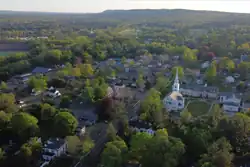 Farmington, Connecticut by drone, May 2020 | |
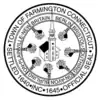 Seal | |
| Motto(s): "Respecting History, Planning The Future"[1] | |
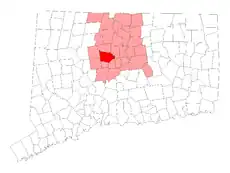  | |
| Coordinates: 41°43′40″N 72°50′25″W | |
| Country | |
| U.S. state | |
| County | Hartford |
| Region | Capitol Region |
| Settled | June 1640 |
| Incorporated | December 1645 |
| Consolidated | 1947 |
| Communities | Farmington Bensted Corner East Farmington Heights Farmington Station Oakland Gardens River Glen Unionville |
| Government | |
| • Type | Council-manager |
| • Town Council | C.J. Thomas (R), Chm Rafeena Bacchus Lee (D) Joseph Capidoferro (R) Edward Giannaros (D) Johnny Carrier (R) Brian Connolly (D) Keith Vibert (R) |
| Area | |
| • Total | 28.8 sq mi (74.5 km2) |
| • Land | 28.0 sq mi (72.6 km2) |
| • Water | 0.8 sq mi (2.0 km2) |
| Elevation | 161 ft (49 m) |
| Population (2020) | |
| • Total | 26,712 |
| • Density | 930/sq mi (360/km2) |
| Time zone | UTC−5 (Eastern) |
| • Summer (DST) | UTC−4 (Eastern) |
| ZIP Codes | 06032, 06085 |
| Area code(s) | 860/959 |
| FIPS code | 09-27600 |
| GNIS feature ID | 0213430 |
| Interstates | |
| U.S. Highways | |
| State Routes | |
| Website | www |
History
Eighteenth and nineteenth centuries
| Town | Date of separation |
|---|---|
| Harwinton (portion) | 1737 |
| Southington | 1779 |
| Berlin | 1785 |
| Bristol | 1785 |
| Wolcott (eastern part) | 1796 |
| Burlington (from Bristol) | 1806 |
| Avon | 1830 |
| Bloomfield | 1835 |
| New Britain (from Berlin) | 1850 |
| Plainville | 1869 |
Farmington was originally inhabited by the Tunxis Indian tribe. In 1640, a community of English immigrants was established by residents of Hartford, making Farmington the oldest inland settlement west of the Connecticut River and the twelfth oldest community in the state. Settlers found the area ideal because of its rich soil, location along the floodplain of the Farmington River, and valley geography.
The town and river were given their present names in 1645, which is considered the incorporation year of the town. The town's boundaries were later enlarged several times, making it the largest in the Connecticut Colony. The town was named "Farmington" on account of its location within a farming district.[3]
Farmington has been called the "mother of towns" because its vast area was divided to produce nine other central Connecticut communities. The borough of Unionville, in Farmington's northwest corner, was once home to many factories harnessing the water power of the Farmington River.
Farmington is steeped in New England history. Main Street, in the historic village section, is lined with colonial estates, some of which date back to the 17th century. On May 19, 1774, in response to the adoption of the Boston Port Act, the people of Farmington assembled, held a mock trial for the bill, found the bill guilty of "being instigated by the devil," and subsequently had a copy of the bill hung and then set on fire.[4] During the Revolutionary War, George Washington passed through Farmington on several occasions and referred to the town as "the village of pretty houses."[5] In addition, French troops under General Rochambeau encamped in Farmington en route to Westchester County to offer crucial support to General Washington's army.
Nineteenth century
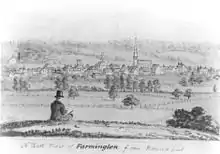

The majority of Farmington residents were abolitionists and were active in aiding escaped slaves. Several homes in the town were "safe houses" on the Underground Railroad. The town became known as "Grand Central Station"[6][7] among escaped slaves and their "guides".
Farmington played an important role in the famous Amistad trial. In 1841, 38 Mende Africans and Cinqué, the leader of the revolt on the Amistad slave ship, were housed and educated in Farmington after the U.S. government refused to provide for their return to Africa following the trial. The Mende were educated in English and Christianity while funds were raised by residents for their return to Africa.
The Farmington Canal, connecting New Haven with Northampton, Massachusetts, passed through the Farmington River on its eastern bank and was in operation between 1828 and 1848. The canal's right of way and towpath were eventually used for a railroad, portions of which were active up to the 1990s. Part of the canal and railroad line has now been converted to multi-use paved trails, called the Farmington Canal Heritage Trail and the Farmington River Trail, respectively.[8]
Geography

According to the United States Census Bureau, the town has a total area of 28.8 square miles (74.5 km2), of which 28.0 square miles (72.6 km2) is land and 0.77 square miles (2.0 km2), or 2.65%, is water.[9]
After its founding, Farmington gave up territory to form Southington (1779), Bristol (1785), Avon (1830), Plainville (1869), and parts of Berlin (1785) and Bloomfield (1835).[10] Farmington presently borders the towns of Avon, Burlington, Newington, West Hartford, and Plainville, and the cities of New Britain and Bristol.
Farmington is mostly wooded, but there are also meadows and hills in the east and southeast. There are also numerous ponds and lakes. The Farmington River runs through the town from the northwest from Burlington, enters Unionville, then takes a sharp turn near Farmington Center and flows north towards Avon. The Metacomet Ridge, a 100-mile (160 km) range of low traprock mountain ridges, occupies the east side of Farmington as Pinnacle Rock, Rattlesnake Mountain, Farmington Mountain, and Talcott Mountain.
Demographics
| Year | Pop. | ±% |
|---|---|---|
| 1756 | 3,707 | — |
| 1774 | 6,069 | +63.7% |
| 1782 | 5,542 | −8.7% |
| 1790 | 2,696 | −51.4% |
| 1800 | 2,809 | +4.2% |
| 1810 | 2,748 | −2.2% |
| 1820 | 3,042 | +10.7% |
| 1830 | 1,901 | −37.5% |
| 1840 | 2,041 | +7.4% |
| 1850 | 2,630 | +28.9% |
| 1860 | 3,144 | +19.5% |
| 1870 | 2,616 | −16.8% |
| 1880 | 3,017 | +15.3% |
| 1890 | 3,179 | +5.4% |
| 1900 | 3,331 | +4.8% |
| 1910 | 3,478 | +4.4% |
| 1920 | 3,844 | +10.5% |
| 1930 | 4,548 | +18.3% |
| 1940 | 5,313 | +16.8% |
| 1950 | 7,026 | +32.2% |
| 1960 | 10,813 | +53.9% |
| 1970 | 14,390 | +33.1% |
| 1980 | 16,407 | +14.0% |
| 1990 | 20,608 | +25.6% |
| 2000 | 23,641 | +14.7% |
| 2010 | 25,340 | +7.2% |
| 2020 | 26,712 | +5.4% |
| Source: Interactive Connecticut State Register & Manual and U.S. Census Bureau, Population Division | ||
As of the census[11] of 2010, there were 25,340 people, 9,496 households, and 6,333 families residing in the town. The population density was 879.9 inhabitants per square mile (339.7/km2). There were 11,072 housing units at an average density of 351.2 per square mile (135.6/km2). The racial makeup of the town was 85.92% White, 2.21% African American, 0.04% Native American, 9.59% Asian, 0.49% from other races, and 2.43% from two or more races. Hispanic or Latino of any race were 2.98% of the population.[12]
There were 10,522 households, out of which 29.6% had children under the age of 18 living with them, 53.7% were married couples living together, 8.0% had a female householder with no husband present, and 35.7% were non-families. Of all households, 29.6% were made up of individuals. The average household size was 2.38 and the average family size was 3.00.
In the town, the population was spread out, with 22.0% under the age of 18, 4.7% from 18 to 24, 29.7% from 25 to 44, 25.7% from 45 to 64, and 15.5% who were 65 years of age or older. The median age was 40 years. For every 100 females, there were 90.0 males. For every 100 females age 18 and over, there were 85.3 males.
In 2018, the median household income was $94,606 and the per capita income for the town was $56,571.[13] About 3.1% of families and 5.8% of the population were below the poverty line, including 3.9% of those under age 18 and 6.3% of those age 65 or over.
Government and politics
| Year | Democratic | Republican | Third Parties |
|---|---|---|---|
| 2020 | 59.95% 9,616 | 38.41% 6,160 | 1.64% 261 |
| 2016 | 53.37% 7,634 | 41.79% 5,977 | 4.84% 692 |
| 2012 | 50.89% 7,013 | 47.97% 6,611 | 1.15% 158 |
| 2008 | 57.48% 8,088 | 41.38% 5,822 | 1.14% 161 |
| 2004 | 52.62% 7,209 | 45.97% 6,298 | 1.41% 193 |
| 2000 | 51.49% 6,374 | 43.97% 5,443 | 4.55% 563 |
| 1996 | 47.48% 5,415 | 41.56% 4,739 | 10.96% 1,250 |
| 1992 | 39.74% 4,917 | 39.54% 4,893 | 20.72% 2,564 |
| 1988 | 45.12% 4,847 | 54.02% 5,803 | 0.86% 92 |
| 1984 | 37.25% 3,542 | 62.37% 5,931 | 0.38% 36 |
| 1980 | 34.91% 3,173 | 47.47% 4,314 | 17.62% 1,601 |
| 1976 | 41.63% 3,536 | 58.01% 4,927 | 0.35% 30 |
| 1972 | 39.56% 3,087 | 59.54% 4,646 | 0.90% 70 |
| 1968 | 44.80% 2,942 | 50.75% 3,333 | 4.45% 292 |
| 1964 | 63.04% 3,568 | 36.96% 2,092 | 0.00% 0 |
| 1960 | 45.44% 2,545 | 54.56% 3,056 | 0.00% 0 |
| 1956 | 30.71% 1,434 | 69.29% 3,236 | 0.00% 0 |
| Voter Registration and Party Enrollment as of February 22, 2023[16] | |||||
|---|---|---|---|---|---|
| Party | Active Voters | Percentage | |||
| Democratic | 6,684 | 33.10% | |||
| Republican | 4,513 | 22.35% | |||
| Unaffiliated | 8,693 | 43.05% | |||
| Minor parties | 301 | 1.49% | |||
| Total | 20,191 | 100% | |||
Economy
Top employers in Farmington according to the town's 2021 Comprehensive Annual Financial Report[17]
| # | Employer | # of Employees |
|---|---|---|
| 1 | University of Connecticut Health Center | 6,355 |
| 2 | Connecticut Children's Medical Center | 1,251 |
| 3 | Town of Farmington | 809 |
| 4 | Otis Worldwide | 800 |
| 5 | ConnectiCare | 700 |
| 6 | Macy's | 500 |
| 7 | Trumpf | 500 |
| 8 | Tunxis Community College | 500 |
| 9 | American Red Cross | 388 |
| 10 | Allied World Assurance Company | 350 |
Farmington is home to a significant and growing number of corporations. Fortune 500 industrial conglomerate United Technologies is headquartered on Farm Springs Road along with its subsidiary Otis Elevator. Carvel, ConnectiCare, Farmington Displays, and Horizon Technology Finance, all maintain corporate headquarters in Farmington. Other prominent employers include the American Red Cross, Bank of America, Farmington Sports Arena, McKesson, Stanley Black & Decker and TRUMPF Inc.
Farmington Bank was headquartered in town until it was acquired by People's United Bank in 2018.
The Jackson Laboratory of Bar Harbor, Maine, is building a new facility on the grounds of the University of Connecticut Health Center, which specializes in the research and development of genomic medicine. The project is part of BioScience Connecticut, an initiative designed to launch Connecticut into the forefront of biomedical research. A growing collection of doctor's offices and medical practices is concentrated in the vicinity of the University of Connecticut Health Center.
Farmington is unique in that more people work within the town lines than actually live there, a characteristic atypical of a traditional suburb.
Arts and culture
Locations listed on the National Register of Historic Places

- Austin F. Williams Carriagehouse and House – 127 Main Street (added 1998)
- Farmington Historic District – Porter and Mountain Rds., Main and Garden Sts., Hatter's and Hillstead Lanes, and Farmington Ave. (added 1972)
- First Church of Christ – 75 Main St. (added 1975)
- Gen. George Cowles House – 130 Main St. (added 1982)
- Gridley-Parsons-Staples Homestead – 1554 Farmington Ave. (added 1981)
- Hill-Stead Museum (added 1991). The estate, completed in 1901 and designed for Alfred Atmore Pope by his daughter Theodate Pope Riddle, one of the first woman American architects, is known for its Colonial Revival architecture. Now a museum, its 19 rooms hold a nationally recognized collection of Impressionist paintings by such masters as Manet, Monet, Whistler, Degas and Cassatt. It is the site of the annual Sunken Garden Poetry Festival and is a National Historic Landmark.
- Pequabuck Bridge – Meadow Rd. at Pequabuck River (added 1984)
- Shade Swamp Shelter – US 6 E of New Britain Ave. (added 1986)
- Stanley-Whitman House – 37 High St. (added November 15, 1966)
- West End Library – 15 School St., Unionville (added 2000)
Education
Farmington Public Schools operates public schools.
Farmington's seven public schools are highly regarded rank among the top in the state and nationally. [18] The district's four pre-K to 4 elementary schools are Union School, West District School, Noah Wallace School, and East Farms School. West Woods Upper Elementary School houses grades 5 and 6. Irving A. Robbins Middle School houses grades 7 and 8. Farmington High School serves grades 9–12. In 2005, Farmington High School was ranked 125 on Newsweek magazine's list of the best schools in the United States, in 2006 it was ranked 269, and in 2007, 298.[19]
Miss Porter's School, a private college preparatory school for girls, is located in Farmington's Historic District. The day and boarding school occupies much of the village center. Founded in 1843 by educational reformer Sarah Porter, the school has played a significant part in Farmington's history since its founding. As of the mid-2010s, the school owned over 90 buildings in Farmington center, approximately 70% of which were historic. Since then, Miss Porter's has been concentrating its footprint around its core buildings at the center of Main Street. Famous alumni include Jacqueline Kennedy Onassis, Princess Anastasia of Greece & Denmark, Lee Bouvier Radziwill, Lilly Pulitzer and members of the Bush, Vanderbilt, and Rockefeller families.
Tunxis Community College is in the southwest part of the town.
Infrastructure
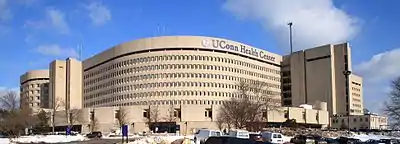
The University of Connecticut Health Center in Farmington employs approximately 4,600 full-time employees as of 2021.[20] The Health Center also houses John Dempsey Hospital. The hospital provides the only full-service emergency department in the Farmington Valley and a Level III Neonatal Intensive Care Unit (NICU), one of only two in Connecticut.
Connecticut's first temple of the Church of Jesus Christ of Latter-day Saints opened in Farmington in 2016.
Transportation
Connecticut Transit Hartford provides local bus service.
Notable people
- Tim Abromaitis, professional basketball player
- Steve Addazio, college football coach[21]
- Richard M. Bissell Jr., Central Intelligence Agency officer responsible for the U-2 spy plane project and the Bay of Pigs Invasion[22]
- Nick Bonino, NHL hockey player[23]
- Anna Roosevelt Cowles, eldest sister of President Theodore Roosevelt and aunt of Eleanor Roosevelt[24]
- Ron Francis, NHL hockey player, former Farmington resident
- Kevin Galvin, business and health care advocate[25]
- Michael Gladis, actor, raised in Farmington and graduated from Farmington High School[26]
- George Gleason, Wisconsin state assemblyman[27]
- Joab Hoisington, one of the founders of Vermont, militia leader on the Patriot side in the American Revolution[28][29]
- Orville Hungerford, U.S. congressman[30]
- Curtis Jackson, hip hop rapper and entrepreneur, more commonly known as 50 Cent[31]
- Tebucky Jones, former New England Patriots football player
- Chauncey Langdon, U.S. congressman from Vermont, born in Farmington[32]
- Timothy Merrill, Secretary of State of Vermont[33]
- Mary Jane Osborn, biochemist and microbiologist, died in Farmington in 2019 at the age of 91.[34]
- Erin Pac, U.S. Olympic Women's bobsled team and two-woman bobsled event bronze medalist at the 2010 Winter Olympics[35]
- Alfred Atmore Pope, industrialist and art collector, resided at Hill-Stead from 1901 to 1913; father of Theodate Pope Riddle[36]
- Theodate Pope Riddle, noted architect and founder of Hill–Stead Museum[37]
- Aric Rindfleisch, professor of business administration and department head at the College of Business at Illinois[38]
- Kathleen Rubins, NASA astronaut and 60th woman in space; born in Farmington[39]
- Pawel Szajda, actor, born and raised in Farmington, graduated from Farmington High School[40]
- Kristen Taekman, model and cast member of The Real Housewives of New York City, born and raised in Farmington
- Eli Todd, pioneer in the treatment of mental disorders
- John Treadwell, fourth governor of the state of Connecticut[41]
- Mike Tyson, former resident. In 2004, 50 Cent bought Tyson's 18-acre (73,000 m2) compound, which is located about 2 miles (3.2 km) southeast from the town center[42]
- Suzy Whaley, the first female golfer to qualify for a PGA event; currently the president of the LPGA[43]
- Wilford Woodruff, fourth president of the Church of Jesus Christ of Latter-day Saints (LDS Church), born in Farmington[44]
See also
References
- "Town of Farmington Connecticut". Town of Farmington Connecticut. Retrieved September 22, 2012.
- "Census - Geography Profile: Farmington town, Hartford County, Connecticut". United States Census Bureau. Retrieved December 15, 2021.
- The Connecticut Magazine: An Illustrated Monthly. Connecticut Magazine Company. 1903. p. 332.
- "Proceedings of Farmington, Connecticut, on the Boston Port Act; May 19, 1774". Avalon Project. Retrieved July 4, 2021.
- Glasberg, Eve (March 3, 2006). "A 'Village of Pretty Houses,' Where Women's Lives Were Reshaped". The New York Times. Archived from the original on March 13, 2007. Retrieved March 15, 2007.
- "Underground Railroad, Black History Freedom Trail and Amistad Sites Tour in Farmington". Heritage Trails Sightseeing Tours. Archived from the original on September 25, 2010. Retrieved September 20, 2010.
- "History of Farmington". Farmington Historical Society. Archived from the original on November 9, 2010. Retrieved September 20, 2010.
- "Trail System | Town of Farmington, CT". www.farmington-ct.org. Retrieved December 9, 2020.
- "Geographic Identifiers: 2010 Demographic Profile Data (G001): Farmington town, Hartford County, Connecticut". U.S. Census Bureau, American Factfinder. Archived from the original on February 12, 2020. Retrieved November 26, 2012.
- Barry, Ann P. “Connecticut Towns and Their Establishment.” Hartford, CT: Connecticut State Library, Archives, History, and Genealogy Unit, 1985.
- "U.S. Census website". United States Census Bureau. Retrieved January 31, 2008.
- "Farmington, Connecticut fact sheet". American Fact Finder. United States Census Bureau. 2010. Archived from the original on December 3, 2007. Retrieved March 6, 2007.
- "U.S. Census Bureau QuickFacts: Farmington town, Hartford County, Connecticut". www.census.gov. Retrieved July 8, 2020.
- "General Elections Statement of Vote 1922".
- "Election Night Reporting". CT Secretary of State. Retrieved May 2, 2021.
- "Election Data - Town of Farmington". Town of Farmington. Retrieved April 28, 2023.
- "Comprehensive Annual Financial Report of the Town of Farmington, Connecticut For the Year Ended June 30, 2021". Town of Farmington. Retrieved January 29, 2023.
- "Farmington School District Overview". www.niche.com. Retrieved August 6, 2022.
- Bondy, Halley; Brillman, Dan; Kaufman, Becca. "The Top of the Class". Newsweek. Archived from the original on June 8, 2007. Retrieved June 17, 2007.
- "UConn Health Annual Report 2021" (PDF). Retrieved August 6, 2022.
- "Steve Addazio". Official Site of The Boston College Eagles. Archived from the original on December 18, 2013. Retrieved March 7, 2014.
- Binder, David (February 8, 1994). "Richard M. Bissell, 84, Is Dead; Helped Plan Bay of Pigs Invasion". The New York Times. New York. Retrieved January 2, 2015.
- "Put Down The Cigarette . . . And Drop Out of BU". SB Nation. October 19, 2009. Retrieved March 7, 2014.
- "'Green' Garden with Roosevelt Ties Part of Farmington Tour". The Courant. May 31, 2013. Retrieved March 7, 2014.
- "Handyman at Work on a Booming Business". The Courant. Retrieved March 7, 2014.
- "Michael Gladis". The Courant. Archived from the original on March 7, 2014. Retrieved March 7, 2014.
- THE LEGISLATIVE MANUAL OF THE STATE OF WISCONSIN (15th ed.). Madison, Wis. 1876. p. 475.
{{cite book}}: CS1 maint: location missing publisher (link) - Register of the California Society of the Sons of the American Revolution. San Francisco, CA: California Society, Sons of the American Revolution. 1901. p. 90 – via Google Books.
- Dana, Henry Swan (1889). History of Woodstock, Vermont. Boston, MA: Houghton, Mifflin and Company. pp. 17–19 – via Google Books.
- "HUNGERFORD, Orville, (1790 - 1851)". Biographical Directory of the United States Congress. Retrieved March 7, 2014.
- "50 Cent's Farmington Mansion Still On The Market". The Courant. Archived from the original on March 7, 2014. Retrieved March 6, 2014.
- "LANGDON, Chauncey, (1763 - 1830)". Biographical Directory of the United States Congress. Retrieved March 7, 2014.
- Thompson, Daniel. P. (1860). History of the Town of Montpelier. Montpelier, VT: E. P. Walton. pp. 211–213.
- "Retrospective: Mary Jane Osborn (1927–2019)". www.asbmb.org. Retrieved May 19, 2019.
- "Erin Pac Returns Home With Olympic Medal". The Courant. Retrieved March 7, 2014.
- Linebaugh, Donald (2012). The Springfield Gas Machine: Illuminating Industry and Leisure, 1860s–1920s. Univ. of Tennessee Press. p. 302. ISBN 9781572338357.
- Joan Marter (2011). The Grove Encyclopedia of American Art, Volume 1. Oxford University Press. p. 147. ISBN 9780195335798.
- "Profile".
- https://www.jsc.nasa.gov/Bios/htmlbios/rubins-k.pdf
- "Pawel Szajda". The Courant. Archived from the original on March 7, 2014. Retrieved March 7, 2014.
- "Connecticut Governor John Treadwell". National Governors Association. Retrieved May 24, 2014.
- "50 Cent Shows Off Mansion On 'Cribs'". CBS News. November 29, 2007.
- "Suzy M. Whaley, PGA". PGA. Retrieved March 7, 2014.
- "Wilford Woodruff-Fourth President of the Church". The Church of Jesus Christ of Latter-Day Saints. Retrieved March 7, 2014.

